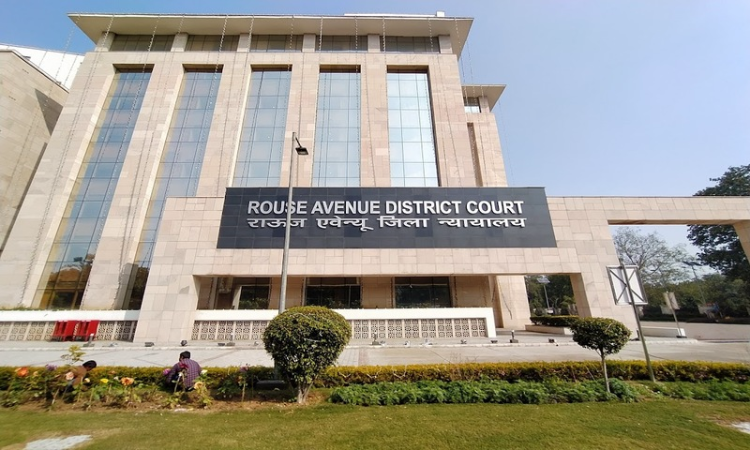Territorial Jurisdiction Of CBI Special Court Situated At Delhi's Rouse Avenue Court Complex, Challenged
LIVELAW NEWS NETWORK
8 Dec 2021 3:51 PM IST

Image: in.worldorgs.com
Jurisdiction of the CBI Courts situated at the Rouse Avenue Court Complex, New Delhi to try and entertain the matters under the Prevention of Corruption Act, 1988 was questioned during the course of arguments upon the application u/s 91 Cr.P.C. preferred in the matter of CBI v. S.K. Jain & Others pending before the Court of Sh. Chandra Shekhar, Ld. Special Judge, R.A.C.C., New Delhi.
During the course of arguments, the court questioned its territorial jurisdiction to try the present case. Applicant Sudhir Kumar Jain, former CMD Syndicate Bank, presented by his Counsel Mr. Harsh K. Sharma Advocate, assisted by Ms. Vaibhavi Sharma & Mr. Lakshya Parasher & Ms. Bhumika Yadav, Advocates, drew the attention of the court towards the contents of Paragraph No. 17.22, of the chargesheet, wherein CBI had claimed that, "This cash transaction of Rs. 125 Lakhs was facilitated by Shri Naresh Chandnani, an Angadia of Bhopal on the directions of Purshottam Totlani, from Mumbai to Bhopal in the month of July, 2014 through Shri Ashish Parekh, an Angadia from Mumbai. Both of them corroborated this fact in their statement recorded before Ld. MM, Patiala House Courts, New Delhi. This cash amount was arranged by Shri Mukesh Jindal and Pawan Bansal in Mumbai."
Counsel for Sh. S.K. Jain argued at length and it was contended that "Section 4 of the PC Act relates to the jurisdiction of the court for trial of offences under that Act. The first sub-section of Section 4 declares that notwithstanding anything contained in the Code or in any other law, the offences punishable under the PC Act can be tried only by the Special Judge, appointed under Section 3(1) of the PC Act. Now sub-section (2) of Section 4 is the important provision and it is extracted below:
"4(2). Every offence specified in sub-section (1) of section 3 shall be tried by the special Judge for the area within which it was committed, or, as the case may be, by the special Judge appointed for the case, or, where there are more special Judges than one for such area, by such one of them as may be specified in this behalf by the Central Government."
Thus, the only court which has jurisdiction to try the offences under the PC Act is the court of Special Judge appointed for the areas within which such offences were committed. When such an offence is being tried sub-section (3) enables the same Special Judge to try any other offence which could as well be charged against that accused in the same trial. So the pivot of the matter is to determine the area within which the offence was committed.
For that purpose it is useful to look at Section 3(1) of the PC Act. It empowers the Government to appoint Special Judge to try two categories of offences. The first is, any offence punishable under this Act and the second is, any conspiracy to commit or any attempt to commit or any abetment of any of the offences specified in the first category. So when a court has jurisdiction to try the offence punishable under the PC Act on the basis of the place where such offence was committed, the allied offences such as conspiracy, attempt or abetment to commit that offence are only to be linked with the main offence. When the main offence is committed and is required to be tried it is rather inconceivable that jurisdiction of the court will be determined on the basis of where the conspiracy or attempt or abetment of such main offence was committed. It is only when the main offence was not committed, but only the conspiracy to commit that offence or the attempt or the abetment of it alone was committed, then the question would arise whether the court of the Special Judge within whose area such conspiracy etc. was committed could try the case. For our purpose it is unnecessary to consider that aspect because the charges proceed on the assumption that the main offence was committed."
It was further submitted by Advocate Harsh K. Sharma that in the year 2019, a similar issue of law was raised in the case titled CBI v. D.K. Nayyar & Others, wherein at the stage of final arguments, the Chargesheet was returned back by the Ld. Special Judge, to be filed in appropriate court, as it was held by the Special Court that the courts in Delhi have no jurisdiction to try the said matter.
The counsel appearing for the CBI sought some time to reply to the submissions and the arguments put forth by the Counsels for the accused.
S.K. Jain alongwith CMD Prakash Industries Limited and 6 others were booked by the CBI under relevant Sections of Prevention of Corruption Act and Criminal Conspiracy.


